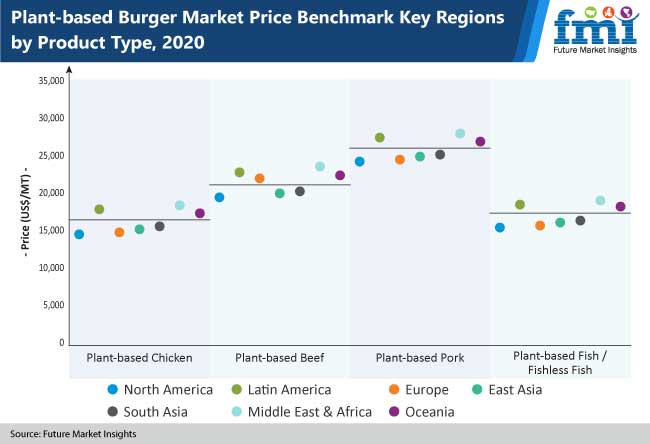Plant-based burger market is witnessing a spike in demand, which is expected to continue post pandemic according to a recent report published by Future Market Insights (FMI). Although the pandemic has hit production and supply chains across the world, the global plant-based burgers market has managed to attract demand from consumers says FMI.
The global plant-based burgers market is poised to witness extraordinary growth with CAGR of above 22% for the forecast period 2020-2030, according to FMI. Though plant based burgers were originally developed with vegan and vegetarian consumers in mind, many others are also joining in the ongoing trend. The concepts like ‘flexitarians’ and similar others are gaining traction owing to concerns for health as well as eco system.
Furthermore, animal borne diseases such as COVID-19, SARS, bird flu and many others are pushing more people towards plant based food products. The magnitude and intensity of novel Corona virus is making consumers opt for healthier food substitutes with high nutritional value.
Plant based burgers are made as replacement of regular animal meat burger, using plant ingredients and natural sources without compromising the benefits, but attempting to reduce the drawbacks. These greener and healthier alternatives to the existing food choices are gaining momentum in the market post the onset of COVID-19 suggests report.
To Get Sample Copy of Report Visit @ https://www.futuremarketinsights.com/reports/sample/rep-gb-12766
Some of the key takeaways from the report are as follows:
- Europe to continue as the largest market in terms of market size throughout the forecast period
- Plant based beef is identified as the most lucrative product in the segment
- Brands in the food and beverages industry looking to partnering with plant based food companies to expand reach
- HoReCa (food service sector) to emerge as the largest distribution channel throughout forecast period
- East Asia and Latin America to achieve highest growth by the end of forecast period 2020-2030
“As the demand for plant-based burger continues to grow, market players are aiming at innovating packaging and storage solutions to ensure nutrients in their products remain intact for a longer period. They are even forging partnerships with several leading names in food chains to ensure they have a widespread footprint” says analyst at FMI.
COVID-19 Impact on Plant Based Burgers Market
COVID-19 pandemic has impacted life and business since its advent. The lockdowns imposed by the governments to reduce the impact of the pandemic has brought businesses across the world to halt. Many businesses incurred heavy losses owing to the shutdowns in the production. However, plant based food was one particular industry which saw a spike in growth amidst all the uncertainty caused by the pandemic.
This growth could be attributed to the fear in people’s minds because of the animal borne disease such as COVID-19. As the impact of the disease grew stronger, the growth in the sales of healthy and nutritious plant based meat substitutes saw exponential increase. Lockdown imposed in March 2020 saw one of the biggest spikes in sales of plant based meat substitutes in regions including Europe, North America, Latin America and others.
Who is Winning?
Companies are looking at mergers and acquisitions as the key strategy to gain advantage over the competitors in the market.
Many popular brands in the food and beverages industry are partnering with plant based food companies to reach out to the vegan, vegetarian and flexitarian community.
For instance, fast food giants such as burger King, McDonalds and many other popular restaurant chains are partnering with popular plant based burger brands such as impossible burgers, beyond meat and so on to cater to the wider group of consumers.
Many other food joints are following suit and bringing plant based meat substitutes to their menus. Rising popularity of plant based foods is forcing known brands and new players in the food industry to invest big in the market.
For instance, Burger King partnered with ‘Impossible foods’, a popular brand of plant based products to offer plant based burgers to its customers. Introducing these plant based options has helped Burger King in gaining advantage over rival and popular brand McDonalds. It also increased its customer base as vegan and vegetarian consumers were added because of the new additions in the offerings.
Valuable Insights on Plant-Based Burger Market
Future Market Insights, in its new offering, provides an unbiased analysis of the Plant-based burger market, presenting historical demand data (2013-2019) and forecast statistics for the period from 2020-2030. The study divulges compelling insights on the plant-based burger market based on product type (burger patty, crumbles & grounds, sausages, hot dogs, nuggets, bacon chips, deli slices, chunks & tips, shreds, cutlet, strips, tenders, & fingers, and meatballs (meatless)), source(soy-based protein, wheat-based protein, pea-based protein, canola-based protein, fava bean-based protein, potato-based protein, rice-based protein, lentil-based protein, flax-based protein, chia-based protein, and corn-based protein), by distribution channel (hypermarkets/supermarkets, convenience stores, specialty food stores, online retail, and HoReCa (food service sector)) across four major regions.
Download Complete TOC of this Report: https://www.futuremarketinsights.com/toc/rep-gb-12766
Plant-Based Burgers Market Report: Scope
| Attribute | Details |
| Forecast Period | 2020-2030 |
| Historical Data Available for | 2015-2019 |
| Market Analysis | USD Million for value and units for volume |
| Key Regions Covered | North America, Europe, East Asia, Latin America, South Asia, Oceania, and Middle East and Africa (MEA) |
| Key Countries Covered | US, Canada, Brazil, Mexico, Rest of Latin America, Germany, Italy, France, Spain, U.K., Russia, Rest of Europe, China, Japan, South Korea, India, Malaysia, Thailand, Indonesia, Australia, New Zealand, South Africa, and Rest of MEA |
| Key Segments Covered | Product type, Source, Distribution channel, Region |
| Key Companies Profiled | MorningStar Farms, Sotexpro SA , Crown Soya Protein Group , Puris Proteins, LLC Ingredion Inc, Beneo GmbH , Glanbia plc , Fuji Oil Co., Ltd., Archer Daniels Midland Company , Symrise , Roquette Frères S.A. ,Kellogg’s,Tyson Foods, Inc. |
| Report Coverage | Market Forecast, brand share analysis, competition intelligence, DROT analysis, Market Dynamics and Challenges, Strategic Growth Initiatives |
| Customization & Pricing | Available upon Request |
Key Questions Answered by the Report
- How big is the plant-based burgers market?The plant based burgers market is expected to reach a valuation of US$ 14 Bn by 2030.
- Which region exhibits highest demand for plant-based burgers?Europe is expected to maintain hegemony over the regional landscape through the course of the forecast period
- Which are the top companies in the plant-based burgers market?Key players operating in the market include MorningStar Farms, Sotexpro SA , Crown Soya Protein Group , Puris Proteins, LLC Ingredion Inc, Beneo GmbH , Glanbia plc , Fuji Oil Co., Ltd., Archer Daniels Midland Company , Symrise , Roquette Frères S.A. ,Kellogg’s, and others.
- Which is the most preferred distribution channel in the plant-based burgers market?The HoReCa (Food service sector) segment is expected to channel the majority of revenue to the plant based burgers market through the forecast period.
- What is the outlook on the plant-based burgers market?The growth of the plant based burgers market is primarily attributed to the rising concerns about health and nutrition worldwide.
Enquiry before Buying
- Is this research conducted by Future Market Insights?Yes, the research has been conducted by expert analysts of Future Market Insights through a combination of primary research and secondary research. To know more about how the research was conducted, you can speak to research analyst.
- What research methodology is followed by FMI?FMI follows a methodology that encompasses demand side assessment of the market, and triangulates the same through supply side analysis. This methodology is based on use of standard market structure, methods and definitions.


